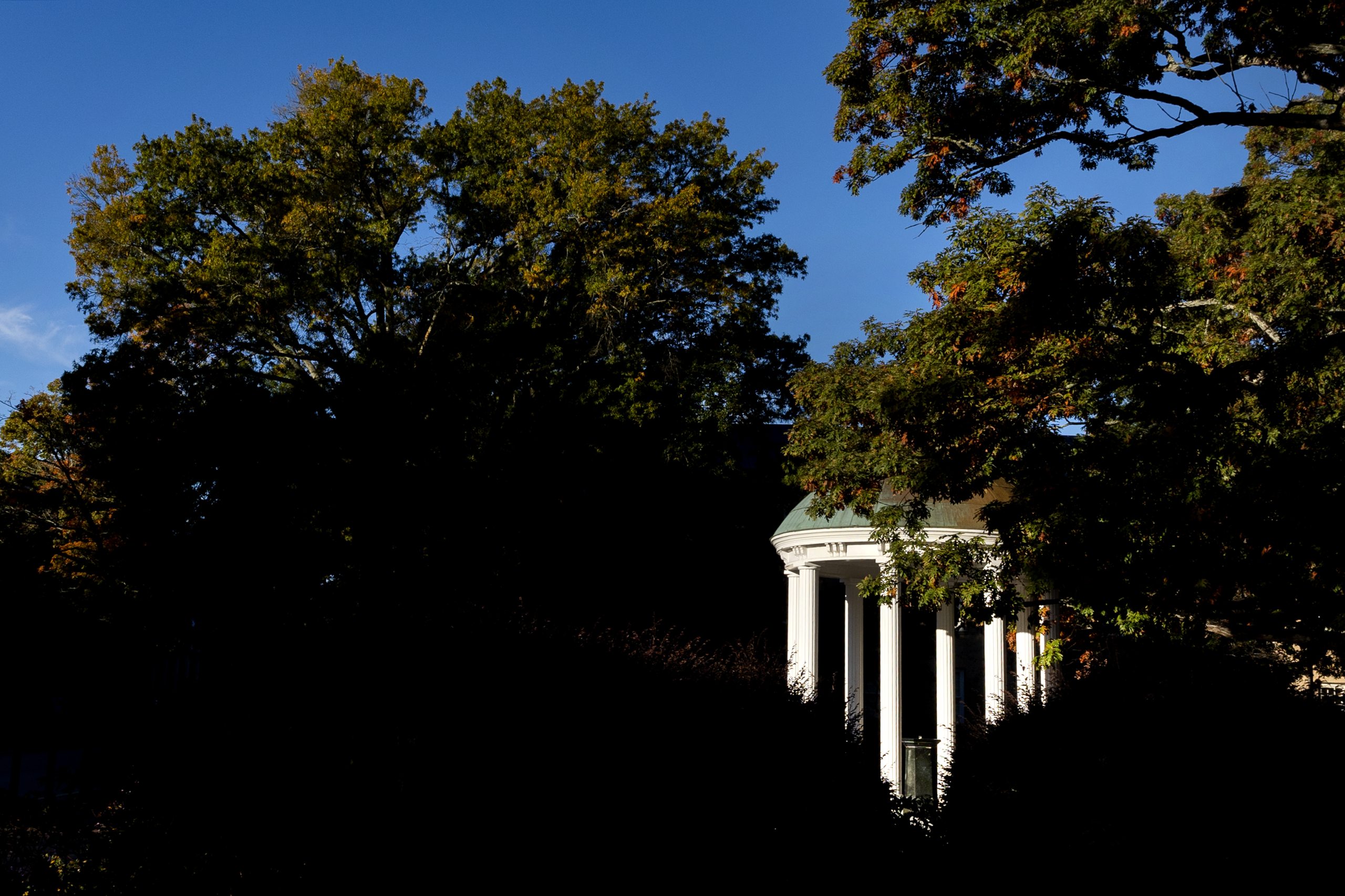Employee Forum: salaries, job searches, more
Delegates heard reports on salary banding and the University’s role in HR decisions, while telling campus leaders what may be hurting Carolina’s ability to attract job candidates.

Stagnant pay, hiring challenges, salary ranges. Those words came up frequently during the April 6 Employee Forum virtual meeting as delegates talked with two University administrators about ways to retain staff and fill job openings with top-notch talent.
Delegates also learned about the status of searches for several deans and senior-level positions, Carolina’s gender violence support, the Alert Carolina system, and Graduate and Professional Student Government.
Human Resources update
Becci Menghini, vice chancellor for human resources and equal opportunity and compliance, reported that:
- Employees will soon receive notice about mandatory training on gender-based violence.
- She is on a task force with the Office of State Human Resources (OSHR) that seeks flexibility in determining SHRA employee pay, particularly as a way to retain workers. The UNC Board of Governors is expected to (and on April 7 did) approve personnel rules to:
- Authorize local boards of trustees to perform several hiring actions that previously required UNC System Office or BOG approval.
- Remove salary history from consideration in determining EHRA promotional salary increases. Menghini said that Carolina is trying to effect a similar change for SHRA employees, which OSHR would review.
- Many campus units have submitted Future of Work proposals. Requests for extensions will be reviewed weekly through June.
Menghini then confirmed that OSHR is about 18 months away from implementing a new salary banding system.
Carolina looks to hire at market rates, compared to some other system schools that cannot afford to do so now, she said. That “is a concern when it is time to adopt a new banding system. Are the salary ranges broad enough to address the needs of places like ours? Some of it is related to market, but some of it is also related to size and scope.”
Roundtable with Provost Clemens
Chris Clemens, provost and chief academic officer, gave updates on hiring, including completing the process for directors of the American Indian Center and the Women’s Center and continuing searches for a new Stone Center director, the head of UNC Libraries, deans for the College of Arts & Sciences and the schools of dentistry, government, nursing and public health, and interviewing nominees for academic lead of the School of Data Science and Society.
Later, delegate Shayna Hill said that although candidate pools for leadership openings are strong, filling staff jobs has been challenging. “We can’t attract people, and a lot of us are trying to cobble together several jobs. We want to be able to support these great new leaders coming in, but we’re dying here. We have seen salaries stagnate. We’re happy that there was some movement from the legislature this time around, but benefits have been dwindling. We just don’t appear to be an employer of choice right now, and we’re struggling.”
Clemens asked to dig into Hill’s statements to help him form action items that he could do in addition to what HR is doing. Delegates responded in the Zoom chat and the conversation, repeatedly referring to pay and benefits.
Menghini said that the turnover rate and hiring challenges, particularly for EHRA employees, are related to Carolina having little authority and flexibility in setting salary ranges, something she said she hopes the OSHR task force can improve.
Clemens said that he would find out what Chancellor Kevin M. Guskiewicz is doing and try to help those efforts. “The more our senior leadership is backing Becci and her team in these advocacy efforts and saying what we need in order to effectuate our mission and the more voices we have saying what we need, that will put pressure on them to make a change sooner rather than later.”
He also said:
- His transition team is creating a reorganization plan and permanent ways for faculty and staff to communicate with his office.
- He will soon seek approval for a position focused on faculty advancement and success, which will recruit faculty fellows and provide leadership training.
- Tents on campus will be removed in May.
- Tom Shanahan, chief administrative officer, will attend to legal and administrative matters such as delegated authorities, operating procedures and affiliation agreements between campus units and UNC Hospitals.
Gender violence support and prevention
Gender Violence Services Coordinator (GVSC) Holly Lovern reported on Carolina’s prevention and response to sexual assault and sexual harassment. Carolina’s two GVSCs offer advocacy and free, confidential support to anyone experiencing sexual violence, interpersonal violence, stalking, exploitation or sexual and gender-based harassment. They make no formal report to the University or law enforcement, unless required by law.
Alert Carolina
Clery Compliance Manager Jenn Scott and Director of Emergency Management Darrell Jeter presented on Carolina Alert system operations.
There are four alerts:
- Emergency notifications — significant or dangerous situations posing immediate threat to campus community. This is the only one broadcast via outdoor sirens.
- Crime alerts — serious or continuing threats resulting from a Clery Actcrime occurring on University-owned or controlled property.
- Adverse conditions — severe weather, major utility outages.
- Informational — significant situations, but not emergency or crime.
Scott said that Carolina cannot send notifications that compromise efforts to assist victims or investigate incidents or mitigate an incident’s danger. She stressed that anyone can receive notifications through the Carolina Ready Safety app.
Asked about groups whose presence on campus might make some feel unsafe, Jeter said that, as a public institution, Carolina must be open to free expression. “But if there is an immediate threat, a significant ongoing threat or some public safety concern, we would definitely utilize our system to advise the campus community.”
Amy Johnson, vice chancellor for student affairs, said that her office is working with Information Technology Services and Jeter to create an opt-in tool to send “a more discretionary notice” about groups that may be on campus.
Other business included:
- Approval of Resolution 22-03, “Concerning Sexual Assault and Sexual Harassment,” and Resolution 22-02, “Addressing Serious Retention, Morale and Resource Problems in University Housekeeping Services.”
- Jessica Pyjas, work/life and wellness program manager, recommending:
- Wellness Wednesday Webinars on topics such as financial planning and managing staff through stressful situations.
- The Eat Smart, Move More, Weigh Less program.
- Virtual Mindful Monday sessions.
- Graduate Professional Student Government’s Neel Swamy, immediate past president, and Theodore Nollert, new president, describing GPSG’s structure, recent accomplishments and goals.




